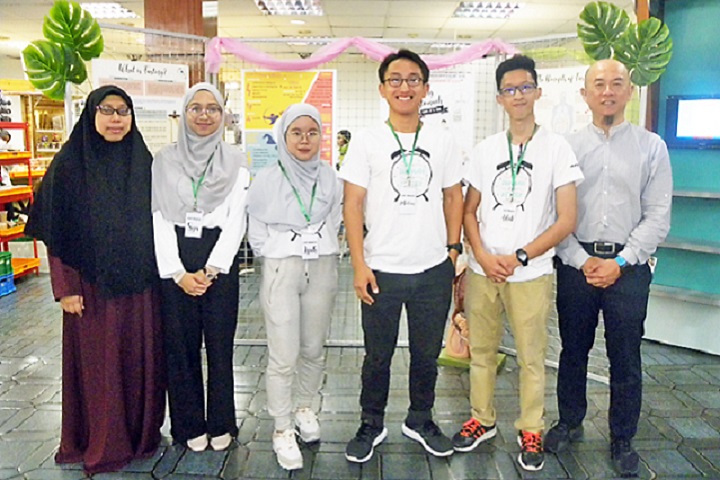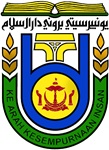
Medical students of Universiti Brunei Darussalam in a group photo with their supervisors during the ‘Healthy With Islam’ roadshow. PHOTO: AZLAN OTHMAN
Health and wellness in Islam
By: Azlan Othman
On: 9 September 2019
In: Borneo Bulletin > National > Features
SEVERAL third year medical students of Universiti Brunei Darussalam (UBD) conducted the ‘Healthy With Islam’ roadshow recently, focusing on health benefits of fasting, praying, participating in sports and eating nutritious meals.
Healthy With Islam is a community health initiative aimed at promoting the health benefits of Islamic practices by educating the public of Brunei, especially youth in higher education institutions.
Medical student Awangku Mohd Adiib bin Pengiran Suhaimi said that the roadshow represented a step towards Brunei’s Health Vision 2035: ‘Together Towards A Healthy Nation’, as Islamic health practices are inexpensive, natural and above all, easy to do. This is an effective disease prevention strategy which cuts health expenses for both the government and the individual alike, benefiting the nation as a whole.
The roadshow was held at Pengiran Anak Puteri Rashidah Sa’adatul Bolkiah Institute of Health Sciences, Universiti Brunei Darussalam (PAPRSB IHS, UBD) at Religious Teachers University College of Seri Begawan (KUPU SB) and at the Raja Isteri Pengiran Anak Saleha (RIPAS) Hospital.
As stated in the book, Islamic Medicine the Key to Better Life by Al-Hajj Ahmad, fasting has been used as a religious and medical practice for thousands of years.
As a religious practice, it is not only found in Islam but also other religions. As a medical practice, the ancient Chinese, Greeks and Romans were known to use fasting to heal patients. With scientific research, we know more of the benefits of fasting and that it positively affects many organs, such as the brain, heart, blood, kidneys and stomach.
Anybody can fast and get its benefits, not just Muslims. However, it is important to be moderate and not to be extreme while fasting as it can cause negative effects on the body, including increased irritability, tiredness and dehydration.
Praying also brings many health benefits. In a book by Kamran G entitled Physical benefits of Salah, as well as by Fatimah Ibrahim and Wan Abu Bakar Wan Abas of Engineering Faculty, Universiti Malaya, performing Takbir at the opening of prayer where hands are raised to the level of ears helps to ease the balance of the body and lower back brought into a neutral position. At the same time, core muscles are also activated and help to straighten the back and improve posture.
Qiyyam or lowering of the hands to the waist (above the belly button) with relaxed shoulders helps to encourage relaxed breathing and makes it so our body weight is evenly distributed on both feet. Wrist joint and muscles are fully rested, allowing smooth joint movement.
Rukuk or bowing with open hands rested on the knees and the back held straight is similar to performing Ardha Uttanasana in Yoga exercise.
Rukuk relieves stiffness at spine, neck and back; improves posture as well as balance and coordination. Strengthened back increases the flexibility and stability of the spine.
Sujud (a congregant goes down on his/her knees and rests his/her hands and forehead on the ground) also brings health benefits to an individual.
The toes, entire vertebral column and spinal muscles experience a stretch.
Performing Sujud also increases lung capacity to increase air inhaled, helping to prevent tuberculosis.
The knees that form a right angle allow abdominal muscles to contract preventing flabbiness.
Performing Jalsa or Tasahhud in prayer where a congregant sits on the floor directly on the ground, while both legs are folded helps to strengthen core muscles. It is also useful for treatment and prevention of lower back pain. Sitting in a kneeling position also helps to prevent heart attacks and stroke, improve flexibility, strengthen ligaments, increase muscle tissue and lower body fats.
Islam has also advised Ummah not to over eat. Al-Musnad (by Imam Ahmad) narrated that Prophet Muhammad (pbuh) said one third should be reserved for food, another third for his drink and the last for his breathing. The benefits are for proper digestion and preventing diabetes and obesity.
According to Islam, taking healthy and nutritious food raises immunity to infections, promotes good concentration and energy levels, faster healing of the body and the person is also less likely to suffer from diabetes and cardiovascular diseases.
One should not eat while reclining to prevent gastric reflux and to prevent choking. According to an Islamic scholar, Ibnu Qaiyyim Al-Jauziyyah, among the advice of doctors is to take a few steps, if possible up to 1,000 steps after dinner, to make it easier to sleep and also help to control blood sugar level which subsequently reduces the risk of developing diabetes.
Sunnah sports and their benefits were also highlighted.
Archery, for instance, improves upper body strength, hand-eye coordination, mental focus, balance and promotes socialisation. It also promotes walking and burn calories.
Scientific health benefits of horse riding can improve coordination, core strength, helps in problem solving skills and improve muscle tone and strength.
Swimming is a whole body workout that burns calories and helps to stay flexible and alleviate asthma. It also increases cardiovascular strength and lowers depression.
